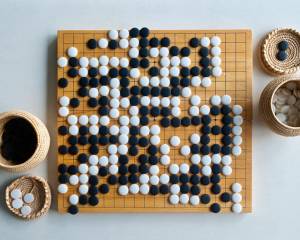AlphaGo’s emphatic victory over human opponent

The battle between man and machine has been contested since the Industrial Revolution. In recent times, this has seen Deep Blue beat Gary Kasparov at Chess in 1997. Over the last week, a similar contest has taken place between Lee Sedol and a Google AI robot at the Four Seasons hotel in Seoul, South Korea. This time with the Chinese board game of Go.
Go dates from 548BC. There are various levels of expertise like martial arts from Double Digit kyu (absolute beginner) to Professional dan (the Creme de la Creme of Go players). With the game demanding a tougher test of logic than Chess, artificial intelligence had hitherto been limited to Amateur dan level. The artificial intelligence of Google’s ActiveGo engine is equal to Professional Dan level.
This was demonstrated when Lee Sedol conceded defeat to Google’s ActiveGo engine. After losing 4 – 1 to the search giant’s AI engine, the Ninth dan Go player rejected another game. Mr Sedol is the second best Go player in the world with eighteen international titles to this name (behind Lee Chang-ho with 21 titles to his name).
ActiveGo, Google’s artificial intelligence engine for mastering the board game of Go, is a product of Google DeepMind. Formed in September 2010, the British team situated in London was acquired by Google in 2014. Among its creations is a neural network, which is able to play video games in a human fashion.
Lee Sedol versus AlphaGo
ActiveGo won the first three games and the fifth game. The first game saw Lee make a promising start, but the last 20 minutes were dominated by ActiveGo who played with the white stones. Game two saw “a near perfect game” for the computer opponent, who opted for the black stones. Back to the white stones, ActiveGo’s third game quashed any possibility of the AI-powered player being an undemanding opponent. Its mettle remained intact after a clinical win in the third game.
For the fourth game, Lee Sedol clinched a win. It was claimed by DeepMind’s Demis Hassabis that ActiveGo slipped up on the 79th move which marked a turning point in the game. A known weakness in ActiveGo’s play algorithms also made Lee’s victory possible. The fifth and final round was ‘business as usual’ for ActiveGo, but it was a close run between Lee Sedol and ActiveGo.
Capturing the imagination
Thanks to Google, the last week has been pretty good for Go. The game’s most ardent players have been in the Far East for thousands of years. In the Western world, it has been slow to catch on with the game gaining acceptance in the 19th Century. The last week saw a reach of 60m viewers with commentary in Korean, Chinese, Japanese and English languages.
It has also been a very good week for Demis Hassabis and his team in London. Their ActiveGo machine has proven how far we have moved on in developing artificial intelligence systems. We wonder how it could measure up against Deep Blue, in Chess or Go.
But Deep Blue was retired by IBM after claims of cheating were made by Gary Kasparov. If ActiveGo can beat the second highest ranked Go player in the world, there’s a chance it could be a Chess champion in waiting. Which brings us to one question: would you rather watch two human beings or two machines in a battle of wits on a Chessboard or a Go board? (Don’t ‘phone, it’s just for fun – but feel free to comment).
Net66, 15 March 2016.
